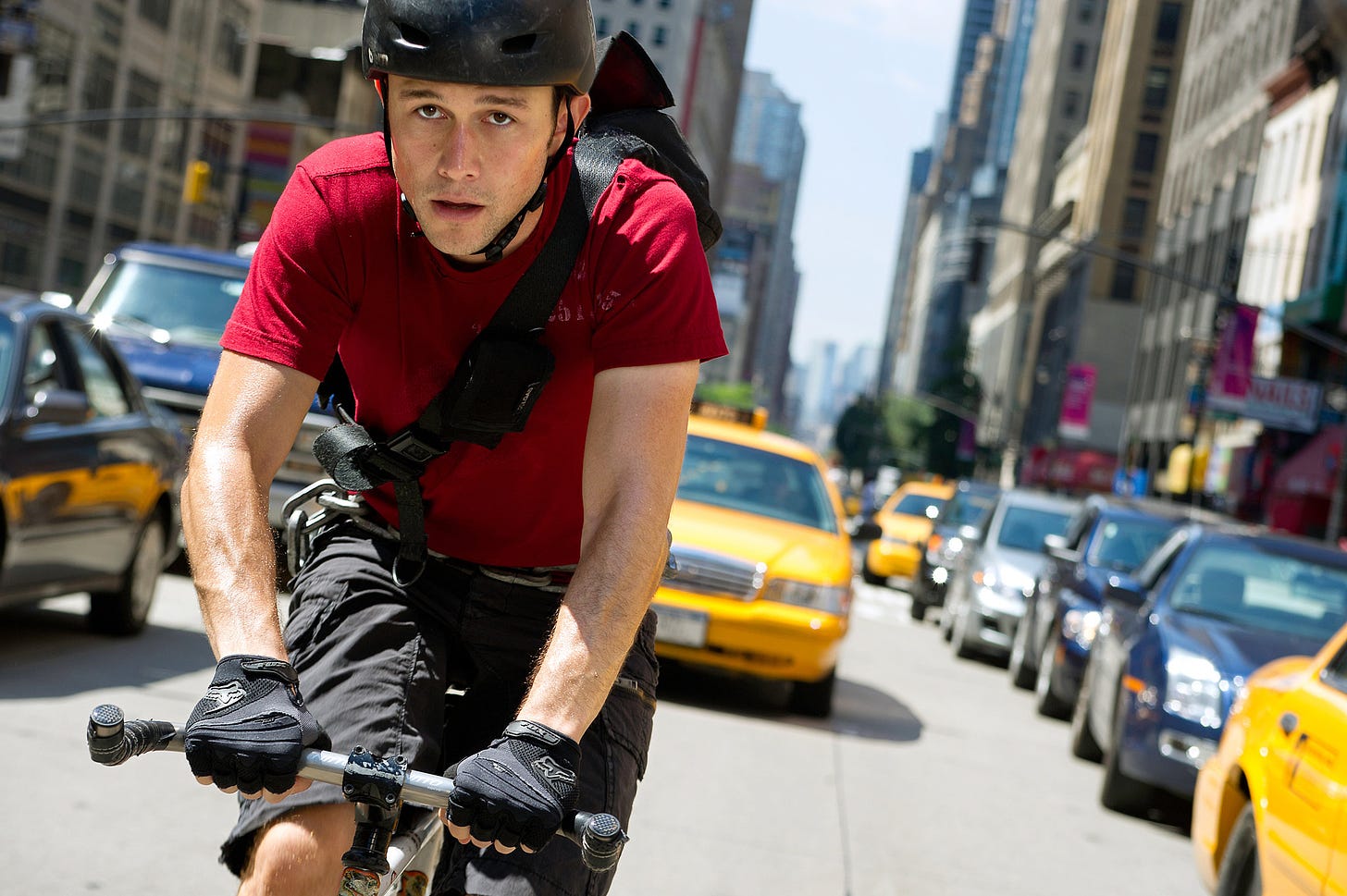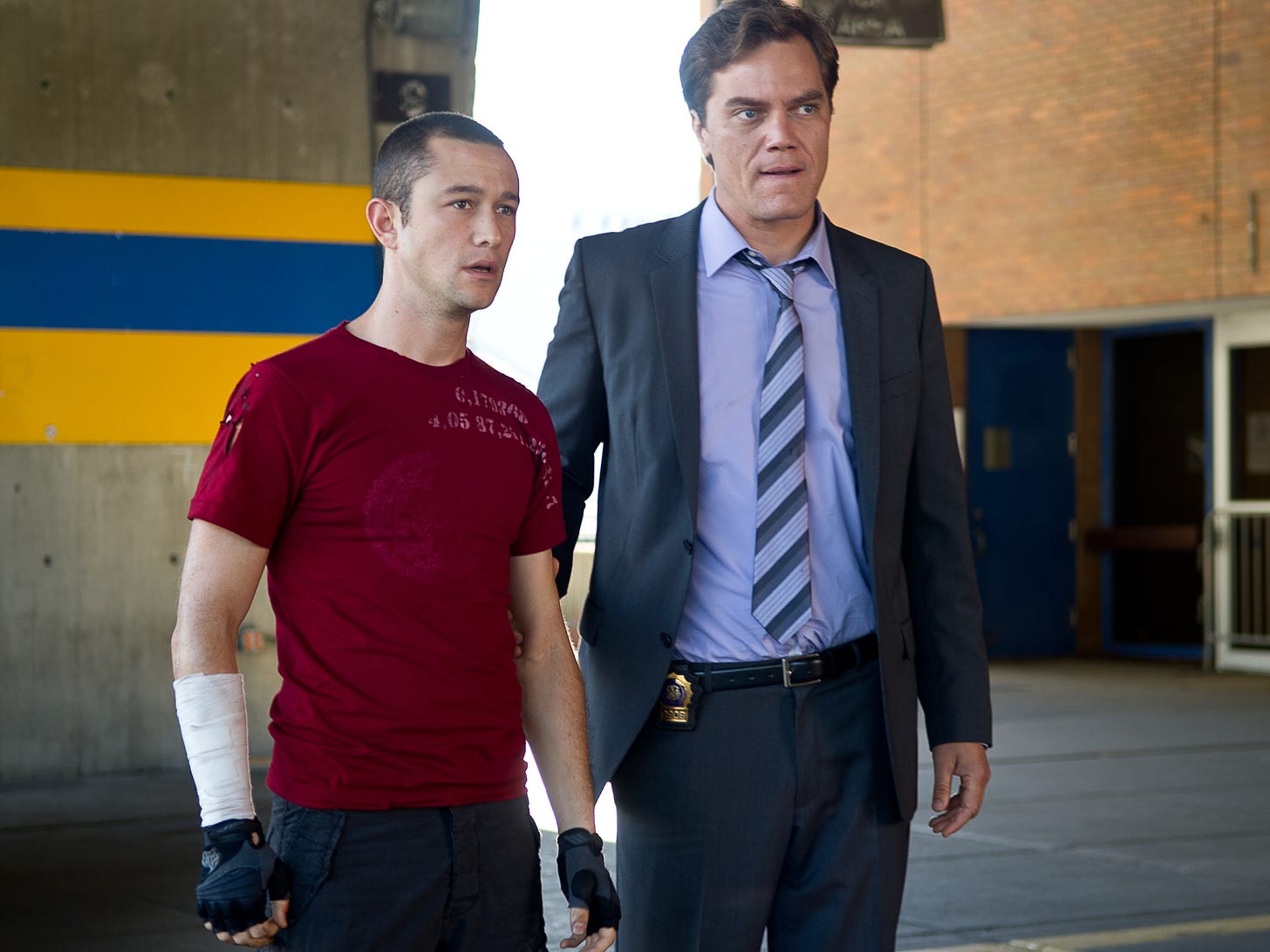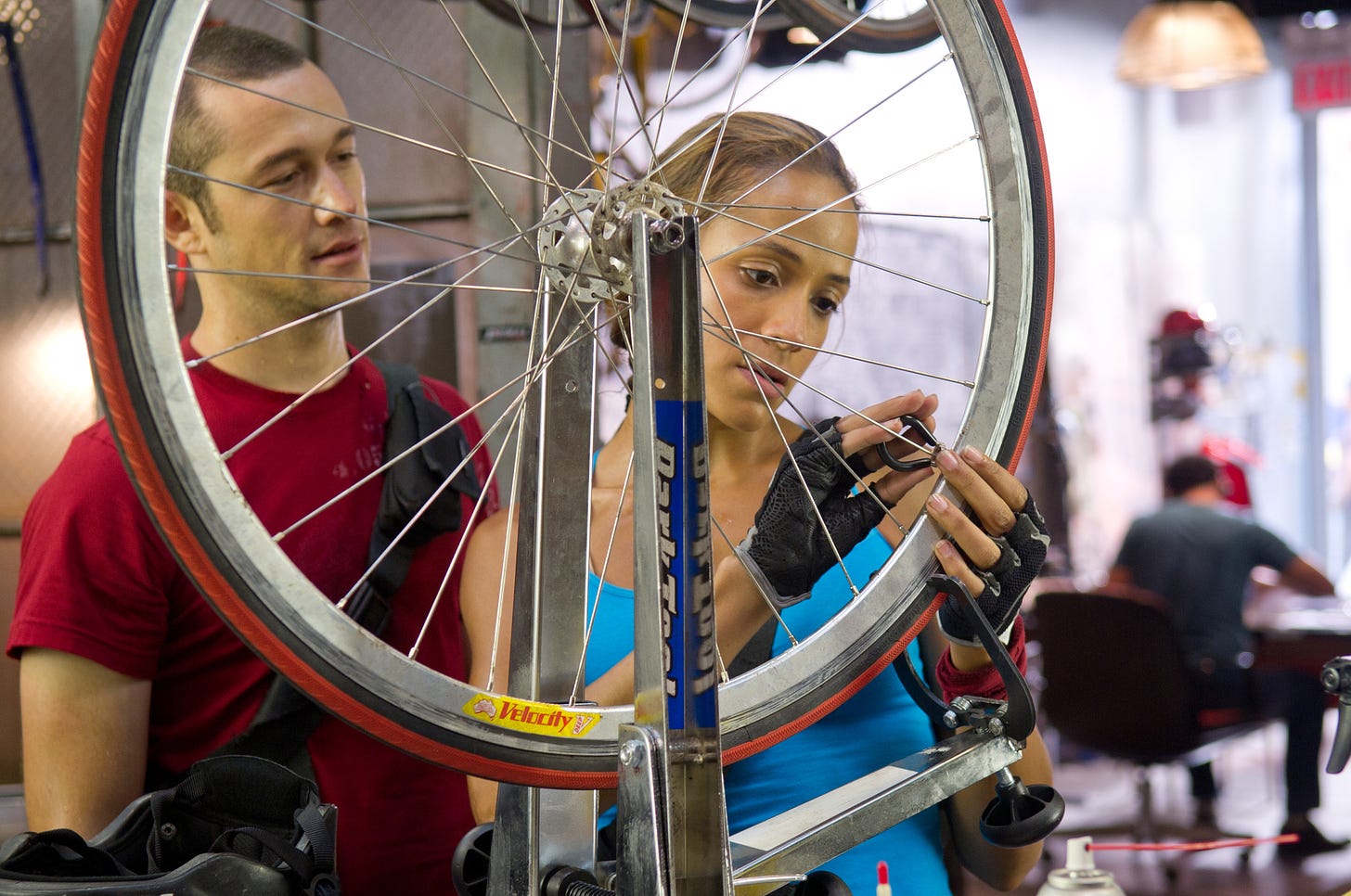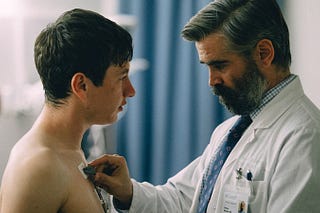
A Tribute to ‘Premium Rush’: The Most August Movie of the Century
In praise of the dog days of summer.
However you define the “summer movie season,” whether it starts on Memorial Day or with some blockbuster that primes the pump even earlier, it never includes August, despite many indicators (oppressive heat, school still out, the hissing of summer lawns) that it belongs with June and July. Yet in the studio schedule, it’s a true wasteland, the fallow period between the last big-budget tentpole—this summer, Deadpool & Wolverine—and the start of the (increasingly theoretical) prestige-movie season in the fall. August is the desert outside Las Vegas in Casino, the arid place where the bodies of misbegotten productions are dumped with marketing campaigns that could be described as unceremonious. It’s the place for auteur misfires, mid-budget flyers, underfunded franchise-starters, and cheap horror films that might steal a slow weekend and duck off into obscurity. Most of the time, Hollywood has no idea what to do with these films, other than to move them to the quietest part of the release schedule and hope that nobody kicks up much of a fuss.
I love August for that reason. It is the month where we found out the answer to the question, “Who is Darkman?”, and the most that brought us Wes Craven’s Red Eye, which Keith already hailed on here as the perfect August movie, an 85-minute (!) thriller with a great cast and not an ounce of narrative fat on its frame. It is the month of delightful auteur larks like Jonathan Demme’s Ricki and the Flash, Steven Soderbergh’s Logan Lucky, George Miller’s Three Thousand Years of Longing, and Michael Mann’s Collateral; of off-beat family entertainments like Kubo and the Two Strings and Pete’s Dragon; and it was once a peak time for Judd Apatow and Adam McKay productions like The 40-Year-Old Virgin, Superbad, Pineapple Express, Talladega Nights, and The Other Guys. Some of these movies flopped, some were sleeper hits (or better), but the stakes are low and the seating is widely available. Save for maybe late January or February, where else on the calendar could you put a dodo-brained M. Night Shyamalan thriller starring his multi-hyphenate daughter and a lead actor two decades past his prime?
Now Red Eye belongs in the conversation as the perfect August movie, but I’m here to make an argument for David Koepp’s Premium Rush as the most August movie of the 21st century, a dog-days-of-summer classic that was released on August 24, 2012 and made $6 million. That was good enough for eighth place, just ahead of the Tommy Lee Jones/Meryl Streep sex-therapy comedy Hope Springs in its third week (another quiet August winner, incidentally) and just behind Dinesh D’Souza’s 2016: Obama’s America, which was in its seventh week of failing to stop the President’s forthcoming bid for a second term. A thriller/comedy about a bike messenger delivering an envelope to Chinatown was bound to face box-office headwinds, but Koepp had probably earned enough studio goodwill to scrape together the $35 million budget, which qualifies as a minimum bet at the Hollywood blackjack table. Over the years, Koepp had been a reliable hand at genre screenwriting—the first two Jurassic Park movies, Mission: Impossible, and Spider-Man are partially or fully credited to him—perhaps a film like Premium Rush could be considered part of an ongoing relationship. It’s not as if Koepp’s previous works as a director—the solid Kevin Bacon horror-thriller Stir of Echoes, the less-solid Johnny Depp thriller Secret Window, and the Ricky Gervais vehicle Ghost Town—had lit the world on fire.
Premium Rush has a lot of wonderful August qualities, like a charismatic, not-quite-A-list star in Joseph Gordon-Levitt and a tight 91 minutes that cheats at being a real-time thriller, but deserves the credit anyway. But what really sets it apart, by principle alone, is that it’s about bicycles, the most adorably uncool mode of personal transport in the movies. Fast bikes do have some history in the medium—on the low end, mostly forgotten mid-’80s vehicles for Kevins Bacon (Quicksilver) and Costner (American Flyer); on the high, 1979’s Breaking Away—but it’s a little like the pamphlet offered to passengers in Airplane! on “Famous Jewish Sports Legends.” Roger Corman never made any exploitation movies about bicycles. The countercultural renegades in The Wild Angels or Easy Rider were not on Schwinns, nor were the devil-may-care gearheads of Vanishing Point or Smokey and the Bandit. The greatest bike-related triumph in movie history is Pee-Wee Herman winning the Tour de France, but even that was only a beautiful dream.
“I can’t work in an office,” says Wilee (Gordon-Levitt), a New York bicycle messenger, in the opening narration. “I don’t like wearing suits. I like to ride. Fixed gear, steel frame, no brakes. The bike cannot coast. The pedals never stop turning. Can’t stop. Don’t want to, either.”
But wait, there’s more: “Some of us get killed out here. Pedestrians are a menace. Cabs are killers. One time or another, we all get hit. Sometimes we hit back.”
He’s. Not. Done Yet.: “[People] have no idea why anyone would risk their lives in a death maze for 80 bucks on a good day. But if you’re out here thinking about the money, you’re not gonna be around to spend it.”
There seems to be some awareness on Koepp’s part about the uphill battle Premium Rush will have to fight to convince audiences that bike messengers can be involved in their own French Connection-style chase sequences through urban traffic snarls. Hence the narration about the live-fast-and-die-young lifestyle of the 1,500 cyclists who zip around New York City, delivering the goods that can’t be shipped securely in a same-day eye blink. And the terrific opening sequence supports Wilee’s narration with handlebar-level shots of Wilee and his comrades weaving through traffic at high speeds, avoiding the cabbies who change lanes without checking their side mirrors or the passengers who swing their doors carelessly to the street side. Manhattan is a hostile island for cyclists, who have no space on the roads and are detested by motorists for claiming it anyway. They may not be rebels per se, but in Koepp’s vision, they’re righteous pests.
Premium Rush starts with Wilee getting hit by a car at 6:33 p.m. and rewinds to 5 p.m., suggesting a tantalizing real-time conceit that it mucks up a little with small flashbacks and other temporal loops, but more or less gets the spirit right. And the plot can be as simple or as complicated as you the viewer chooses to make it. The simple version: Wilee has 90 minutes to pick up an envelope from an unnamed Snooty Eastern College and bike it over to a specific person at a Chinatown address. He will get paid $30 for his service, having failed to talk his boss (Assif Mandvi) into giving him $10 more. In other words, a MacGuffin must move from Point A to Point B.
The complicated version makes Premium Rush sound like a daylight noir: The envelope has a “ticket” inside that represents $50,000, an underground exchange that Nima (Jamie Chung), a Chinese student, has made with a hawaladar to pay for her two-year-old daughter and mother to be smuggled into the States. After catching wind of the envelope, Robert Monday (Michael Shannon), a gambling addict, will stop at nothing to steal the ticket in order to settle his gambling debts. There’s a twist about Monday’s real job that makes things much worse for Wilee and some business involving Wilee’s on-again/off-again messenger girlfriend Vanessa (Dania Ramirez), who happens to have a connection to the whole imbroglio. Between the Chinese underground and the intrepid bike messengers, Koepp has made a film about intersecting New York subcultures, which might have been fascinating if speed wasn’t such a priority.
The name “Wilee” isn’t a mistake, given the Looney Tunes dynamic between Wilee and Monday, but the roles are reversed: Shannon’s Monday is Wile E. Coyote, constantly setting traps that Gordon-Levitt’s Road Runner craftily avoids, often with the trap blowing up in Monday’s face. Koepp’s most inspired touch is to connect the intuition and quickness of a bike messenger to the meep-meep physical comedy of Chuck Jones and company’s twist on the cat-and-mouse cartoon. Much like the Road Runner, Gordon-Levitt isn’t the one who gets the laughs here. Those go to Shannon, who understands the assignment perfectly and leans his chin into every punch the film throws at him. He delights in mocking Wilee with arrogant taunts (“Come on, son, this is silly. You’re going to skin your knee.”) and free-associating about topics like his distaste for the use of phrases like “suck it” on national television. At the same time, his plans backfire so often that he drolly anticipates, Wile E. Coyote-like, the inevitability of getting hit: “Are those Chinese phone books?” he asks the loan sharks pounding him for his debts.
Premium Rush could use more of the Road Runner hijinks and more of the breakneck action sequences where Wilee and friends risk their lives for chump change. Whenever Koepp pauses the action at a particularly nasty cross-street to access Wilee’s split-second analysis of his options, he makes his hero seem like Spider-Man, capable of perceiving a range of possible destinies in slow motion. Yet Premium Rush gets bogged down in flashbacks and subplots that mostly distract from what it does best—not fatally, but enough to keep it from achieving, say, the heights of a disciplined, drum-tight thriller like Red Eye.
Such is the essential August-ness of Premium Rush, a lovable misfit that’s mostly thriller, partly comedy, and humble to the core, seeking out space in a marketplace that’s as antagonistic to movies of its kind as Manhattan traffic is to bike messengers. It’s a little gem that succeeds in getting that MacGuffin from Point A to Point B, just as you paid it to do. Summer may have been over in Hollywood, but that air-conditioning sure did feel cool for 90 minutes.


















I was one of the few people who saw this in a theatre and loved it, Shannon is a skeevy delight throughout. There's a great moment when he talks his way out of his loan sharks office and then upon leaving goes straight across the street into a gambling parlor.
One of the great things about PREMIUM RUSH for those who know New York well is that all of the on-location outdoor shooting is geographically accurate in the order of bicycling from Columbia University to Chinatown. In most movies, a New Yorker is thinking, "They were traveling west, and now they're on the East Side; that makes no sense!" Even Woody Allen doesn't go for that level of accuracy.